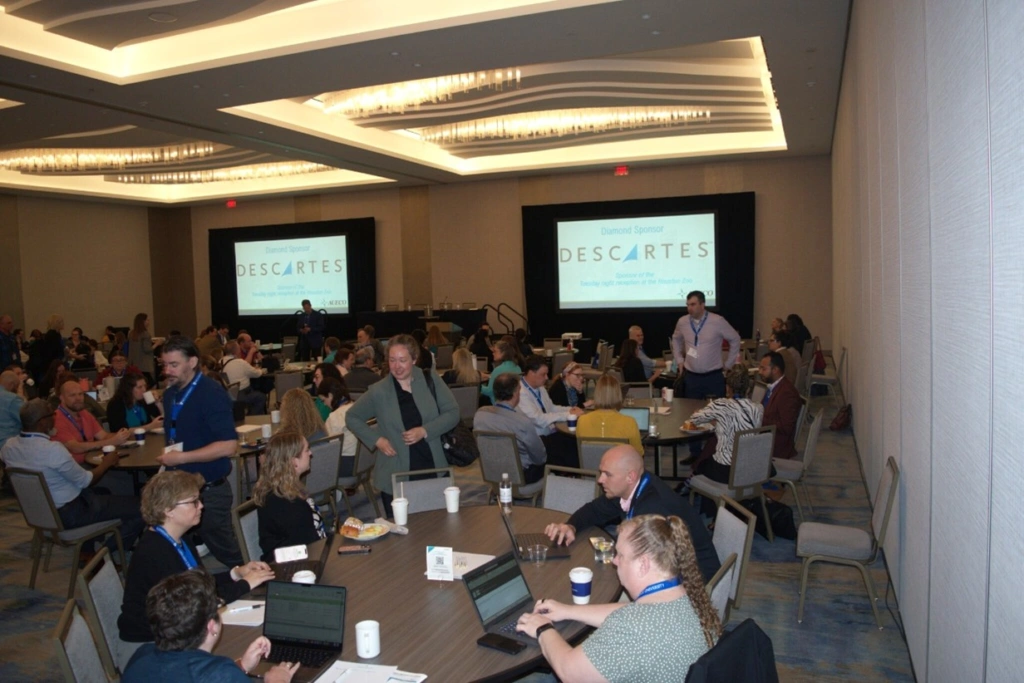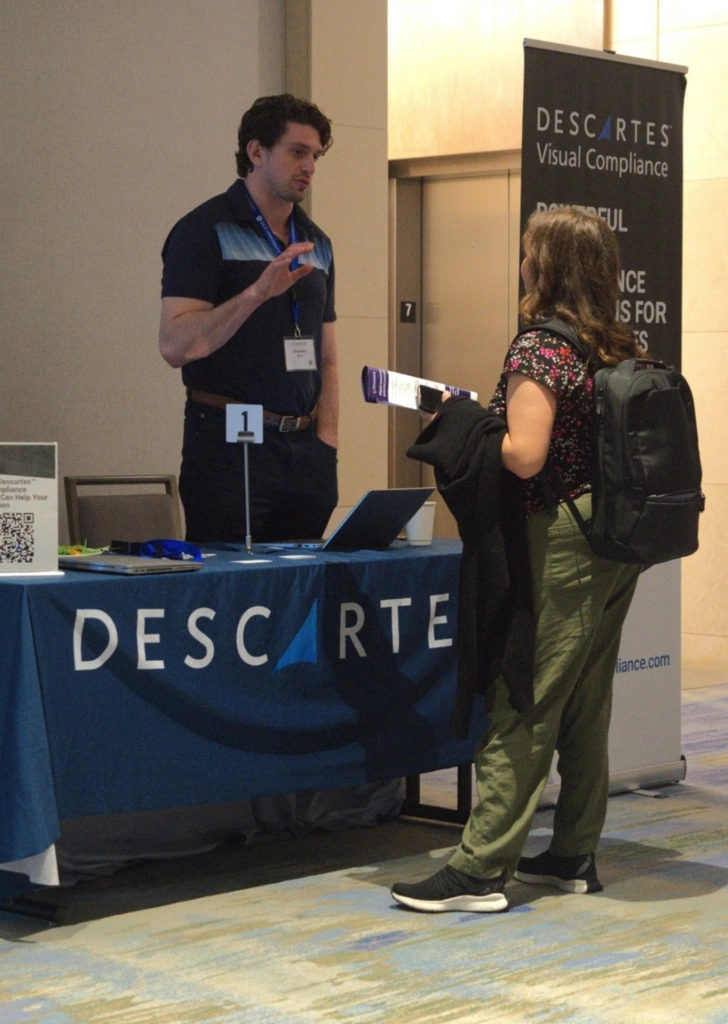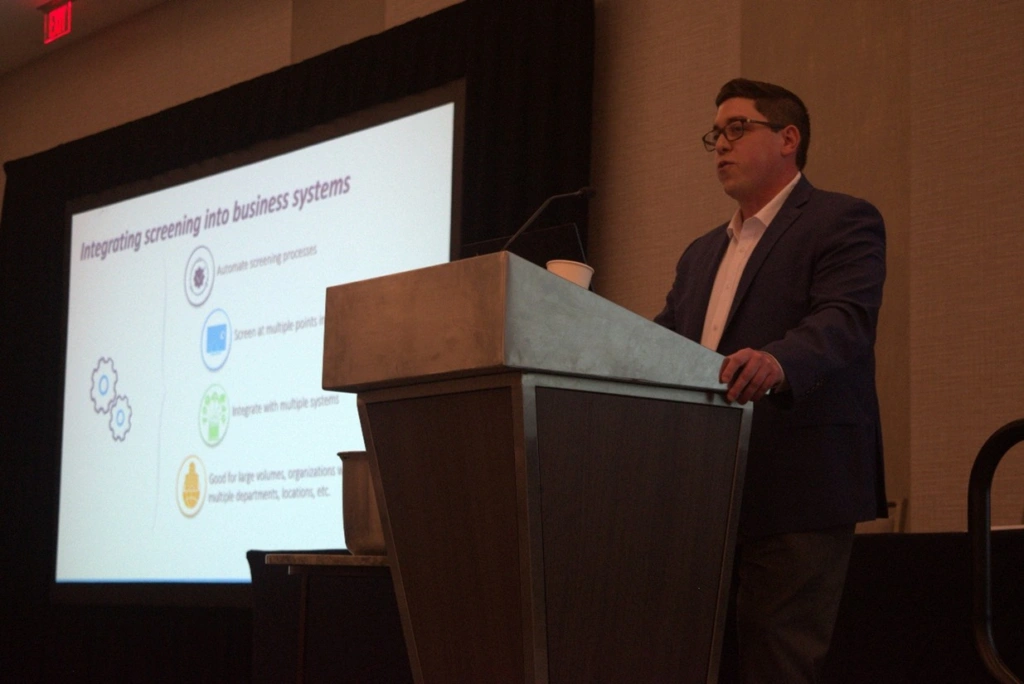Walking into the Intercontinental Hotel in Houston this May, I didn’t just see export compliance professionals—I saw a community. A community made up of university leaders, U.S. government enforcement agencies, international regulatory bodies from the EU, South Korea, and other strategic partners, all working together to protect something bigger than any single institution: our national security and the global pursuit of knowledge. The 2025 Association of University Export Controls Conference (AUECO) brought us together at a critical moment.
Over two days, representatives from the Federal Bureau of Investigation (FBI), Bureau of Industry and Security (BIS), Army Criminal Investigation Division (CID), the State Department, and universities across the country sat at the same table to discuss how export compliance in higher education must evolve. And evolve quickly.
In this article I will share the insights and learnings I gleaned from the event, including best practices for strengthening university export compliance.
Key Takeaways
- A Gathering of Purpose: Universities and enforcement agencies joined forces at the 2025 AUECO Conference to enhance export compliance in higher education, reinforcing best practices through strategic collaboration.
- The Shift in Regulatory Expectations: Universities are no longer insulated from strict export control enforcement. Non-compliance was previously overlooked—no more.
- Today’s Export Compliance Risk Landscape: Universities face increasing export compliance risks, from Iranian sanctions to quantum computing, demanding vigilance in denied party screening, export regulations, and enforcement.
- The Path Forward with Export Compliance as a Strategic Imperative: Proactive investment in export compliance is essential for safeguarding research eligibility and funding. Universities must align with global best practices to mitigate compliance risks.
- Descartes—A Trusted Ally in Academic Export Compliance: With our longstanding expertise, Descartes helps institutions navigate export regulations through tailored denied party screening, automated export license application and management, training, and strategic guidance, ensuring universities stay in control and ahead of evolving risks.
A Turning Point: Export Compliance Expectations for Universities Have Changed
Universities can no longer afford to treat export compliance as an afterthought. The days of leniency are behind us. Previously, non-compliance in higher education may have been overlooked, but today’s enforcement climate has shifted dramatically. Regulators are making it clear: academic institutions are expected to meet the same rigorous export control standards as private industry.
The consequences of falling short are real and immediate. Universities risk losing federal research funding, facing legal scrutiny, and suffering reputational damage that could deter future collaborations. At this year’s AUECO conference, the urgency was palpable. Government agencies and industry leaders reinforced the need for proactive compliance strategies—compliance isn’t just about avoiding penalties anymore; it’s about securing long-term viability.
Yet, the tone wasn’t solely about enforcement—it was about collaboration. Institutions must embrace partnerships that provide strategic guidance, export compliance tools, and training to help them stay ahead. With the right approach, compliance becomes a safeguard, not a burden.

Image 1: A Gathering of Purpose: Descartes Export Compliance Solutions Experts, university leaders, and government officials, at the 2025 AUECO Conference
The Export Compliance Risk Landscape for Academia in 2025
In 2025, universities are navigating a rapidly-evolving export compliance landscape, where they must now meet expectations once reserved for corporations.
As someone who speaks with university compliance teams frequently, I know these aren’t abstract risks—they’re real, daily operational challenges. From tighter enforcement of Iranian sanctions to the evolving classification of emerging technologies like quantum computing, institutions are under growing pressure to proactively manage deemed exports and mitigate foreign national risks.
In practice, this means grappling with overlapping and sometimes conflicting regulations (such as Export Administration Regulations (EAR), International Traffic in Arms Regulations (ITAR)) across these key areas of scrutiny:
Iranian Sanctions & Geopolitical Pressures
The enforcement of Iranian sanctions has taken on a more cautionary tone, especially following past violations tied to academic collaborations. The Trump administration’s reimposition of maximum pressure on Iran—including the high-profile targeting of Qasem Soleimani, an Iranian military officer—underscored the geopolitical risks of even indirect institutional ties. Today, universities must conduct rigorous denied party screening and due diligence to ensure they avoid any unintentional engagement with sanctioned entities
International Student & Faculty Screening
With growing concerns about sensitive research access, universities must refine their screening processes for international students and visiting faculty. Regulatory bodies are paying closer attention to affiliations, research collaborations, and funding sources—meaning institutions must strike a balance between academic openness and assessing compliance risks. This recent case of researchers attempting to smuggle restricted biological pathogens, highlights the present risk and importance of having safeguards.
Deemed Exports & Foreign National Risks
A significant challenge facing universities is the management of deemed exports—unintentional transfers of controlled information to foreign nationals. Whether in lab environments, collaborations, or digital access to research materials, institutions must develop strict safeguards to avoid non-compliance. Managing EAR and ITAR Compliance, classified research, and dual-use items is now a day-to-day necessity.
Quantum Computing: Innovation vs. Risk
The promise of quantum computing is undeniable, but with it comes increased export classification concerns. As agencies like BIS closely monitor advancements, universities must anticipate stricter regulations governing quantum research collaborations and international partnerships. As quantum computing export controls are tightening, universities need to enhance screening and export licensing measures to protect sensitive research.
Department of Energy (DOE) Crossover Regulations & Export Compliance Confusion
A growing pain point for universities is the crossover between DOE regulations and traditional export controls. Several institutions have expressed confusion—particularly when grant-funded research touches on sensitive technologies. Universities engaged in energy research are increasingly finding themselves in uncharted territory, with new restrictions and evolving compliance expectations adding layers of uncertainty.
International Travel & Export Violations
Universities frequently send researchers abroad, but compliance risks tied to international travel continue to escalate. Carrying encrypted devices, sharing research at conferences, or even engaging with foreign collaborators can inadvertently trigger export control concerns, requiring institutions to implement rigorous travel review protocols.
Global Perspectives on Export Compliance and Cross-Border Alignment
Compliance doesn’t stop at U.S. borders. International experts stressed that export compliance is a global challenge, requiring cooperation across borders. They advocated for collaborative compliance models to align regulatory approaches, reducing risks, and enforcement gaps.
Speakers such as those from the Korean Security Agency of Trade and Industry and the Korea Institute of Nuclear Nonproliferation and Control, emphasized common standards and cross-country education as essential tools for harmonization. Joint training and shared best practices can strengthen international security while streamlining compliance.
Ultimately, ensuring trade integrity is a shared global responsibility. No single nation can safeguard security alone—coordinated efforts are key to protecting economic and national interests.

Image 2: Descartes’ Graeden Bird with a member of the university export compliance community.
Export Control Enforcement in Focus: What We Heard from the Front Lines
I was especially grateful for the enforcement panel—with the FBI, BIS, Army CID, and the State Department all participating. Given the importance and unpredictability of their work, their presence spoke volumes about the importance of university compliance.
This was a rare and invaluable opportunity for stakeholders in academia to engage directly with enforcement officials. Their insights provided a practical and transparent guide for universities navigating complex export regulations.
The panel emphasized that open communication, collaboration and proactive engagement with regulators are essential. Several speakers reiterated that while enforcement is real and increasing, compliance signals intent, which is a critical factor in how potential violations are viewed. Their core message? Compliance isn’t about punishment. It’s about protection. They made it clear they see universities as partners in a shared mission.
For many in the room, the panel helped demystify enforcement, offering actionable takeaways and reinforcing the need for robust export compliance programs. It was a standout session that underscored how vital it is to stay informed, connected, and intentional.
The Path Forward: Export Compliance as a Strategic Imperative
Export compliance has become more than just a legal checkbox. It’s a strategic requirement for maintaining research eligibility, securing federal funding, and protecting reputation, and positioning the institution for long-term success.
The institutions leading the way are those treating export compliance not as a siloed obligation, but as a core element of research integrity and operational resilience. Based on conversations with enforcement agencies and university leaders at the conference, here are key best practices for higher education export compliance and building a future-ready program:
- Establish a Cross-Functional Compliance Infrastructure: Universities must move beyond reactive models. Strong export compliance programs need integrated infrastructure that brings together legal, research, IT, HR, and academic leadership to create shared responsibility across departments. This cross-functional approach helps ensure no export control risks fall through the cracks. Leading institutions invest in systems that detect risks early and prevent costly mistakes.
- Upgrade Restricted Party Screening with Smart Automation: Whether managing international collaborations, screening foreign students, or dealing with compliance challenges in quantum computing research, institutions need robust denied party screening tools that can scale and adapt. Artificial Intelligence (AI)-driven solutions, like those discussed at AUECO 2025, streamline export compliance, minimize human error, and scale with institutional needs—simplifying risk management.
- Clarify DOE and Dual Jurisdiction Requirements: The intersection of DOE rules, EAR, and ITAR regulations creates compliance challenges—especially for energy-related and emerging tech research. Institutions that invest in specialized training and clear internal guidance stay ahead of regulatory shifts while reducing enforcement exposure. The right export compliance software with built-in guidance and configurable workflows that align with dual-use regulations can simplify these complexities and ensure consistency across departments.
- Strengthen University-Agency Collaboration: The enforcement panel at AUECO emphasized a key message: trade compliance isn’t just about regulations; it’s also about relationships. Institutions that engage proactively with agencies through training, education, and case collaboration create a culture of compliance that demonstrates good-faith efforts and regulatory integrity—making compliance audits easier to navigate.
- Empower Faculty and Staff with On-Demand Training: At AUECO, several schools shared a common concern: researchers want to do the right thing, but they’re unsure where to start. Proactive institutions offer accessible, digestible training that meets federal expectations and avoids accidental noncompliance. Export compliance solutions providers like Descartes, offer export control-specific resources tailored for academia—covering topics like deemed exports, tech transfers, and sanctions compliance.
- Flag High-Risk Research Early: Regulators are prioritizing AI, quantum computing, and advanced materials as high-risk areas. Universities that embed compliance in early-stage research by conducting thorough risk assessments avoid costly delays and strengthen their research credibility.
- See Export Compliance as an Investment, Not a Cost: The ROI of getting compliance right is tangible: sustained funding, fewer disruptions, and faster research approvals. Universities that leverage cutting-edge compliance tools not only minimize penalties—they enhance their competitive edge in securing top grants and international partnerships.

Image 3: Descartes’ Max Elias delivering a presentation on how universities can manage export control risks with Descartes trade compliance solutions
Closing Reflections: Hope, Dedication, and Global Responsibility
One of the most memorable moments of the conference wasn’t in a panel or breakout session—it was during the networking happy hour sponsored by Descartes at the Houston Zoo. Here, we had the opportunity to connect with clients and partners in an aquarium setting. Conversations flowed as easily as the water around us, highlighting the shared commitment to responsible global research and export compliance.
What struck me most wasn’t just the seriousness of the topics—it was the hope I saw in the eyes of our university clients. Despite mounting challenges, they remain dedicated to global collaboration, safety, and the responsible advancement of research.
These are uncertain times, but they are also inspiring ones. We are proud to stand with institutions that believe compliance isn’t a barrier—it’s a commitment to integrity.

Image 4: Compliance and Currents – A Descartes sponsored happy hour at the Houston Zoo where global security talks met underwater serenity.
How Descartes Helps Universities Stay Ahead of Export Compliance Risks
Universities need more than awareness—they need trusted tools, strategic support, and scalable infrastructure to meet today’s export control demands.
At a time when universities are under increasing pressure to navigate a shifting export compliance landscape, Descartes stands as the longest-standing, safest, and most trusted provider of export compliance solutions for academic institutions. But our value goes beyond software—we’re here as a true partner to help institutions stay informed, empowered, and in control.
From comprehensive denied party screening tools to export license management, risk mitigation, and classification solutions, Descartes delivers purpose-built capabilities designed with academic institutions in mind. Including:
- Denied Party Screening Solutions that integrate seamlessly into existing workflows
- Risk Mitigation Tools covering politically exposed persons (PEP) screening, forced labor, sanctioned party ownership checks, and more
- Export License Acquisition & Management Systems to streamline export operations and compliance processes
- Export Classification & Controlled Technology Management for secure research operations
- Audit and Automated Reporting tools to track what matters and easily demonstrate due diligence efforts
- Training & Expert Guidance from a team with deep experience in higher education use cases
What truly sets us apart is our expert team, many of whom bring real-world experience supporting university compliance programs. Whether it’s tailoring workflows for tech transfer, training researchers on regulatory obligations, or offering guidance on quantum, AI, or DOE crossover risks, we meet institutions where they are—and help them build for where they’re going.
One university leader recently said it best: “Descartes’ denied party screening tools are an invaluable compliance resource. Their training and support have made all the difference in keeping our institution’s due diligence efforts on track.”
With Descartes, universities don’t just meet compliance standards—they set new benchmarks for risk management, research security, and global responsibility.
Want to future-proof your export compliance program? Let’s continue the conversation. Whether you’re navigating new export regulations, concerned about foreign national participation in quantum research, or just trying to cut down on administrative burdens, Descartes can help. Book a personalized demo with me or reach out for more information on how our solutions can support you.
Additionally, you can read this essential buyer’s guide to denied party screening to help you select a solution that fits your needs.



